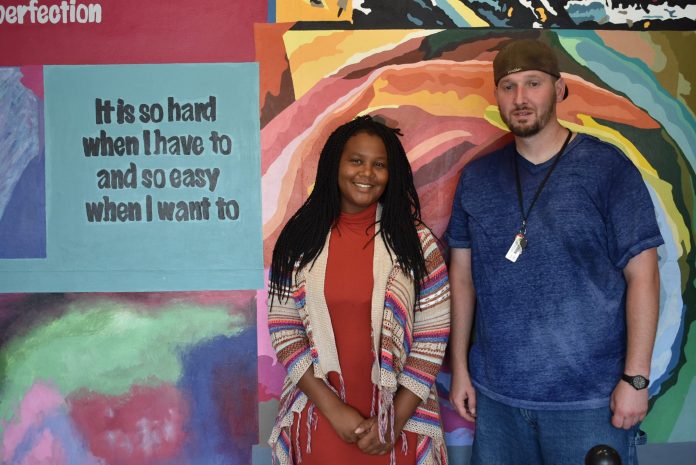Scott Miller leaves for his job as a package handler for UPS at 10 a.m. and doesn’t get home until 1 in the morning, but he’s never been more thankful to be employed. For one thing, he’s been able to lose 30 pounds in the three months he’s been working there. More importantly, he’s glad to be able to give back to society after 17 years of struggling with addiction.
Miller, a Parkwood resident, is the first person to be placed in JEVS Achievement Through Counseling and Treatment (ACT II)’s new employment and education program. The program, located at the center at 1745 N. 4th St., is meant to connect those in recovery to resources to help them begin a new productive chapter in their lives. Services include job search assistance, resume writing workshops and job-readiness classes in order to get individuals to their next opportunity.
In Miller’s case, that meant taking him to a job fair and preparing him for an interview. His schedule may look busy, but he prefers it that way.
“I usually wake up, come here, go to work and go to sleep, and repeat,” he said. “Working obviously helps give something to do so I’m not sitting around the house in my head.”
Miller was 17 when he suffered an accident that would change his life. He was working as a nursing assistant in his journey to becoming an RN when a patient’s knee gave out, pulling him down and damaging the tissue in his back and shoulder blades.
Doctors prescribed him to three months of Percocet to deal with the pain. When his supply was finished, he began experiencing symptoms of withdrawals that he mistook for a cold. He had no idea the medicine containing an opioid combined with a pain reliever could cause him to become addicted, especially when he was prescribed by a doctor at that young age.
“I thought I was just sick,” he said.
A friend recognized his symptoms and gave him Oxycodone, and that was the beginning of Miller’s addictions he would struggle with on and off for the next 16 years of his life. He began going to parties, which eventually led to him trying and becoming addicted to heroin and, later on, alcohol.
It took a lot of dedication in seeking help, going to meetings and staying busy for Miller to turn his life around. He’s been coming to ACT II for 11 years, which, among other things, helped him repair his relationship with his parents and his 13-year-old son.
“I used to barely talk to [his son] and now I’m visiting him every weekend,” he said. “We go for bike rides and walk the dog and play video games.”
The program began thanks to a workforce grant from Philadelphia Works and was an effort from JEVS to combat the opioid epidemic, said Maria Delgado, project manager at ACT Employment.
“A lot of these folks are further along in the recovery process, and it’s nice to see they have something to look forward to and there’s hope,” Delgado said.
Delgado recalled driving Miller to the job fair and going over his job experience with him. He showed them pictures of his son.
“For us to get up to that point, he was so, so proud, and that made me proud,” she said. “When you hear their personal stories, that takes it to another level.”
Miller was the first of 10 people to receive employment in the program’s first three months, including jobs at AutoZone, Four Seasons and Oregon Diner in South Philadelphia.
“Their whole mood changes when they feel like they are doing something to contribute to society,” said Tyeriah Todd, employment specialist. She said she’s seen individuals involved in the program even physically look better after they became motivated to take care of themselves.
Delgado and Todd envision the program continuing to help individuals in recovery and give back to the community.
“We would like to take the stigma of what folks see on the news and the paper, and they don’t typically see what we see or know what we know,” Delgado said. “We want to work with the community to fight the opioid epidemic, not just in our own house, but in the community.”





